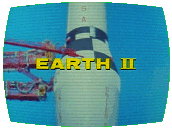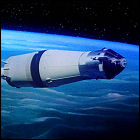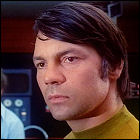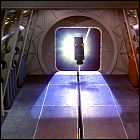 An Apollo spacecraft is launched – despite the attempted interference of a saboteur – with three astronauts and the initial modules of a massive new space station aboard. President Durant of the United States asks American citizens to vote on the founding of a new “nation in space” using this space station as its capitol, and the vote is overwhelmingly in favor of creating a new spacefaring country: Earth II. The station grows in both size and population, setting out to be a completely democratic society in which any citizen can bring an issue up for a vote. But the first real test of Earth II’s leadership arrives in the form of a Chinese orbital nuclear warhead. A team of astronauts from the station sets out to destroy it, but instead the warhead is left intact without the ability to receive commands from Earth. The ramifications of this event reveals a hawkish faction aboard Earth II, insisting that the weapon be kept for the station’s protection. An opposing faction wants the weapon destroyed completely, fearing it represents too much power for anyone to use ethically. And one person, ignoring the democratic process, takes it upon herself to take the action she fears no one else will take, with disastrous consequences.
An Apollo spacecraft is launched – despite the attempted interference of a saboteur – with three astronauts and the initial modules of a massive new space station aboard. President Durant of the United States asks American citizens to vote on the founding of a new “nation in space” using this space station as its capitol, and the vote is overwhelmingly in favor of creating a new spacefaring country: Earth II. The station grows in both size and population, setting out to be a completely democratic society in which any citizen can bring an issue up for a vote. But the first real test of Earth II’s leadership arrives in the form of a Chinese orbital nuclear warhead. A team of astronauts from the station sets out to destroy it, but instead the warhead is left intact without the ability to receive commands from Earth. The ramifications of this event reveals a hawkish faction aboard Earth II, insisting that the weapon be kept for the station’s protection. An opposing faction wants the weapon destroyed completely, fearing it represents too much power for anyone to use ethically. And one person, ignoring the democratic process, takes it upon herself to take the action she fears no one else will take, with disastrous consequences.
written by William Read Woodfield & Allan Balter
directed by Tom Gries
music by Lalo SchifrinCast: Gary Lockwood (David Seville), Scott Hylands (Jim Capa), Hari Rhodes (Loren Huxley), Tony Franciosa
(Frank Karger), Mariette Hartley (Lisa Karger), Gary Merrill (Walter Dietrich), Inga Swenson (Ilyana Kovalefskii), Edward Bell (Anton Kovalefskii), Lew Ayres (President Charles Carter Durant), Brian Dewey (Matt Karger), Diana Webster (Hannah Young), Bart Burns (Stiner), John Carter (Hazlitt), Herbert Nelson (Chairman), Serge Tschernisch (Russian), Vince Cannon (Technician), David Sachs (Surgeon), Bob Hoy (West)
LogBook entry and review by Earl Green
Review: Much-loved by a loyal cult following that saw it hit the air as an ABC Sunday Night Movie in November 1971, Earth II has arrived on manufacture-on-demand DVD, ready for its unflagging fan following to own a copy at least – and ready for new eyes to see what all the fuss was about.
 While time has added a rosy tint to many viewers’ fond memories of Earth II, a fresh viewing doesn’t help it. Earth II can’t help but be what it is: a snapshot of the cultural assumptions of its time, trying to be forward-looking and hopeful. Granted, any movie is going to be a snapshot of its time, but some elements of Earth II are positively laughable by modern standards.
While time has added a rosy tint to many viewers’ fond memories of Earth II, a fresh viewing doesn’t help it. Earth II can’t help but be what it is: a snapshot of the cultural assumptions of its time, trying to be forward-looking and hopeful. Granted, any movie is going to be a snapshot of its time, but some elements of Earth II are positively laughable by modern standards.
Those elements, by the way, do not include what was – for its time – some very nice effects work, considering that Earth II was done for TV (and likely with little more than a TV budget). But some of the basic foundations of the story don’t stand up to scrutiny, including the idea that an Apollo spacecraft would be launched with three men aboard before a public vote could be taken on the notion of those three astronauts starting a new “nation in space” (as if anyone could actually just decide to do that), Furthermore, this decision is determined by measuring the intensity of lighting at night on the continental United States; those in other countries, especially undeveloped ones without nighttime lighting, just don’t count. Apparently this “new country in space” has been set up to reflect and perpetuate American ideals from the get-go (and no one’s going to protest that?). It would’ve been more logical to say that Earth II is a new American state that just happens to be in orbit, because in virtually every respect (despite a few token international characters aboard the space station), it’s simply an extension of the United States.
Let’s keep following that logic. So this new nation is established simply by asking the folks back home to turn on their lights at night if they approve. If Earth II is a sovereign nation and not simply an orbiting backup copy of the U.S., where does it get the resources to build a space station? It’s obvious that the raw material for the huge orbital construct seen during much of the movie wasn’t contained within a single Saturn V rocket. So there had to be further materials and modules launched from Earth – again, presumably by the U.S.
And these are just plot setups in the first act, crumbling under their own weight. Disbelief has to be not just suspended, but discarded entirely to make it through the rest of the movie. Earth II’s completely democratic form of government, which apparently demands and receives 100% participation, is almost as much of a fantasy as a nation-state space station that happens without support from Earth. (We might live in a less cynical, more ideal world if democracy really did work on that principle, or if there was at least more participation, but as it is, it’s another underpinning of this movie’s universe that just doesn’t hold up.)
 The cast is more than capable of bringing the story to life; Gary Lockwood is always one of those utterly likeable actors, and had some sci-fi cachet already, having starred in 2001: a space odyssey and the second Star Trek pilot episode prior to appearing here. Mariette Hartley is a reliable performer saddled with a character whose function in the story reveals that Earth II‘s writers weren’t as forward-thinking as they wanted to believe: her character jettisons the nuclear warhead while the sun is in view, thinking that this is basically the same as disposing of it in the sun (spoiler: it instead starts falling into Earth’s atmosphere, requiring a dangerous retrieval mission). Earth II is meant to be populated by the best and brightest from the planet that launched it; no one operating in space for any length of time would be so stupidly naive about the physics involved. This is compounded by an “awww honey, it’s okay” pat on the head at the end of the movie.
The cast is more than capable of bringing the story to life; Gary Lockwood is always one of those utterly likeable actors, and had some sci-fi cachet already, having starred in 2001: a space odyssey and the second Star Trek pilot episode prior to appearing here. Mariette Hartley is a reliable performer saddled with a character whose function in the story reveals that Earth II‘s writers weren’t as forward-thinking as they wanted to believe: her character jettisons the nuclear warhead while the sun is in view, thinking that this is basically the same as disposing of it in the sun (spoiler: it instead starts falling into Earth’s atmosphere, requiring a dangerous retrieval mission). Earth II is meant to be populated by the best and brightest from the planet that launched it; no one operating in space for any length of time would be so stupidly naive about the physics involved. This is compounded by an “awww honey, it’s okay” pat on the head at the end of the movie.
One frequently hears the name of Gene Roddenberry invoked when this movie is mentioned. Roddenberry has nothing to do with it, but apparently the hopeful vision of a future with true democracy and a space-nation devoted to peace reminds some viewers of Roddenberry’s ideals as seen in Star Trek. (Personally, I think they’re just remembering Genesis II, which was a  Roddenberry pilot, also co-starred Mariette Hartley, and was in many ways just as flawed as Earth II.) But Earth II doesn’t remind me of Roddenberry. It’s not as meticulously thought out as Roddenberry’s work tended to be. And where Roddenberry had notes for further stories that could be told with his Genesis II pilot, no such potential is visible with Earth II (which was apparently also a pilot for a series). This is a self-contained story that doesn’t seem to hint at further stories. Any questions remaining about Earth II as a setting, as potential springboards for further storytelling, fall back into the same huge gaps of logic underpinning the whole story from the beginning. Does Earth II trade with countries on Earth, and what are its imports and exports? Can it ever truly be self-sustaining or is it forever beholden to one or more nations on Earth for its existence? What happens to its citizens if the space station suffers critical damage?
Roddenberry pilot, also co-starred Mariette Hartley, and was in many ways just as flawed as Earth II.) But Earth II doesn’t remind me of Roddenberry. It’s not as meticulously thought out as Roddenberry’s work tended to be. And where Roddenberry had notes for further stories that could be told with his Genesis II pilot, no such potential is visible with Earth II (which was apparently also a pilot for a series). This is a self-contained story that doesn’t seem to hint at further stories. Any questions remaining about Earth II as a setting, as potential springboards for further storytelling, fall back into the same huge gaps of logic underpinning the whole story from the beginning. Does Earth II trade with countries on Earth, and what are its imports and exports? Can it ever truly be self-sustaining or is it forever beholden to one or more nations on Earth for its existence? What happens to its citizens if the space station suffers critical damage?
All of these are potential story starters, but there’s no indication that the writers gave any of these things much thought. The alpha and omega of Earth II seems to be the question “wouldn’t it be groovy if a whole new utopian country started in outer space?” Sure it would. But with no indication that any further thought has gone into the science, politics or economics of such a situation, what you end up with isn’t a story – it’s just that question stretched out over two hours.


